The days of needing complex coding skills to build a website are long gone. Platforms like Ecwid have transformed the process to help users easily create fully functional, profitable websites.
These platforms come equipped with impressive business features that make launching a successful online presence simpler than ever.
However, the world of website creation is continually evolving, leading to a variety of alternatives to Ecwid that can more effectively meet the users’ demands.
After extensive research and practical evaluation of various criteria, we have identified the eight best Ecwid alternatives in 2025. Read on to kickstart your successful ecommerce journey!
Comparison Table Between Ecwid Alternatives
| Platform | Host Type | Target Products | Ease of Use | Pricing | Customization | Support |
| EasyCommerce | Self-hosted | Physical & Digital | Very Easy | Free + Addons | Highly Customizable | Dedicated & Community |
| WooCommerce | Self-hosted | Physical & Digital | Moderate | Free + Extensions | Highly Customizable | Community & Paid |
| WP EasyCart | Self-hosted | Physical & Digital | Easy | Freemium ($69 – $89/year) | Moderately Customizable | Community & Paid |
| Easy Digital Downloads | Self-hosted | Digital only | Easy | Freemium ($99.50 – $499.50/year) | Moderately Customizable | Community & Paid |
| MemberPress | Self-hosted | Memberships | Moderate | $179.50 – $399.50/year | Limited | Community & Paid |
| Shopify | Hosted | Physical & Digital | Very Easy | $19 – $2,300/month | Limited | 24/7 Support |
| BigCommerce | Hosted | Physical & Digital | Easy | $39 – Custom Quote | Limited | 24/7 Support |
| PrestaShop | Self-hosted | Physical & Digital | Moderate | Free + Modules | Highly Customizable | Community & Paid |
8 Best Ecwid Alternatives
There are various options for Ecwid alternatives, available in the market but not all of them can compete with the expectations of modern entrepreneurs.
In the sections below, we will list the best alternatives to Ecwid, both inside and outside WordPress, and compare them to help you find the best one for your business.
WordPress Based Alternatives
1. EasyCommerce
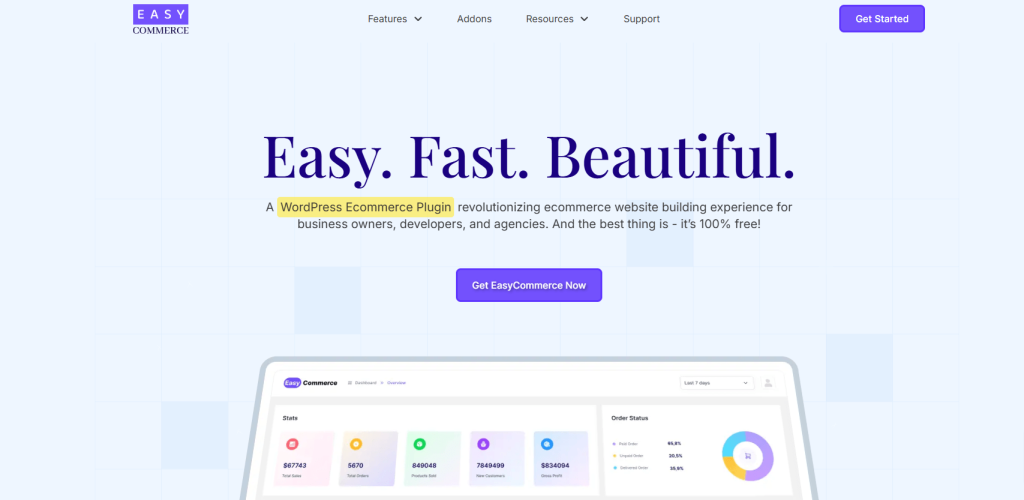
If you’re looking for a powerful alternative to Ecwid for WooCommerce, EasyCommerce is definately worth considering. Coming on top for the best ecwid alternative, EasyCommerce has all the necessary features of Ecwid but with a much faster and smoother interface.
EasyCommerce offers an actionable dashboard with all the business insights you need to make data-driven decisions, all whilst staying on top of your abandoned carts and latest orders.
Unlike other WordPress alternatives for Ecwid, this platform doesn’t depend on the plugin ecosystem to handle all the essential tasks, thereby bloating your website; EasyCommerce comes with all the necessary features built-in so you can start your shop with just a few clicks from installation.
What We Liked About EasyCommerce
- Actionable Dashboard: Get all the necessary business insights, updated in real-time, directly from the dashboard.
- Secure Payment Gateways: Offer popular payment options like PayPal, Square, Mollie, Stripe, Braintree and more.
- Highly Scalable: Grow your catalog, customer base, and more without ever slowing down your website.
- Intuitive Interface: Navigate easily within the plugin and manage your store effortlessly.
What We Disliked About EasyCommerce
- Restricted to WordPress: Unlike Ecwid that can be used in both outside and inside WordPress, EasyCommerce is strictly a WordPress ecommerce plugin.
Pricing
Free to install and use, but addons and hosting may incur additional costs.
2. WooCommerce
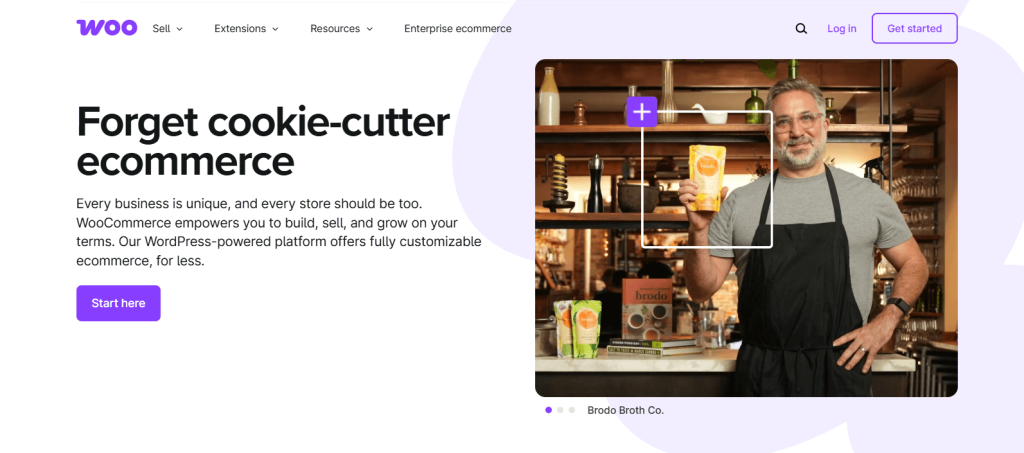
When it comes to Ecwid alternatives, WooCommerce is one of the few that can match the pace of Ecwid and can overcome its limitations too. It is a popular WordPress plugin designed specifically to help users create ecommerce websites in minutes.
This Ecwid alternative is suitable for powering small to medium-sized levels ecommerce stores, especially those that sell physical products. It includes an easy install-and-activation mechanism, as well as, minimal effort from the user’s end to manage fully functional websites.
It not only enhances user convenience but also saves valuable time that can be spent on managing their business.
What We Liked About WooCommerce
- Customization: Over 900 extensions to serve users with varying customization needs.
- Multiple Payment Integrations: Supports 140+ region-centric payment gateway solutions worldwide.
- Maintenance Ease: Users with limited technical knowledge will find its straightforward steps easy to navigate.
What We Disliked About WooCommerce
- Scalability Issue: Enterprise-level users may encounter inoperable or broken sections due to conflicts between third-party plugins.
- Liability: Users are responsible for managing everything from product listings to server upkeep and security maintenance by themselves.
Pricing
Free to install and use. Additional add-ons and plugins may require payment to integrate.
If you’re currently using WooCommerce and want to transition to an easier platform, here’s a list of WooCommerce alternatives to help you decide.
2. WP EasyCart
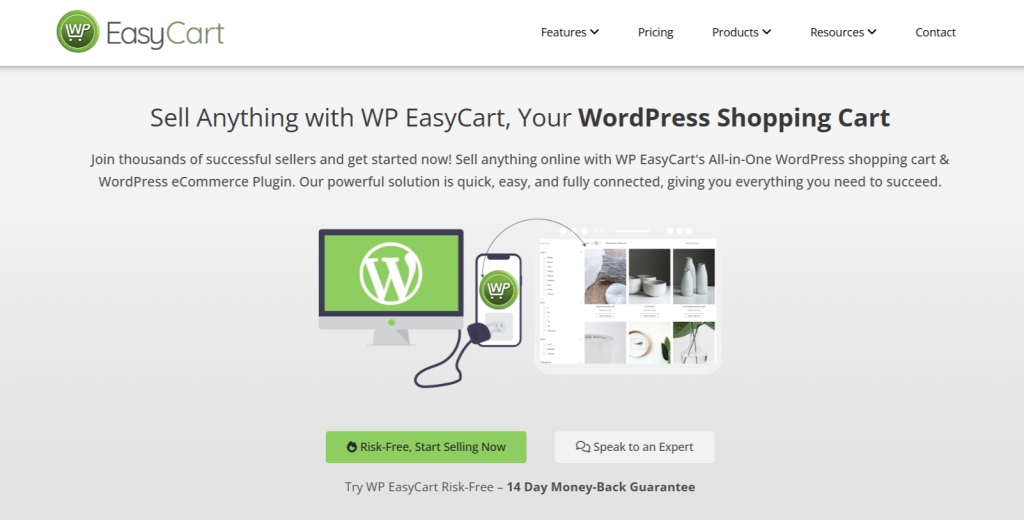
WP EasyCart is a strong alternative to Ecwid, as it comes with powerful features to easily setup your store. It can be used to build new websites or transform any existing WordPress site into a full-fledged ecommerce platform.
Its main benefits include over 30 payment gateway options, highly responsive design across all devices, seamless social media integration, etc., to help businesses stand out across platforms.
With its user-friendly interface and highly efficient features, WP EasyCart isn’t just an alternative to Ecwid, it’s one of the go-to choices for new users seeking an easy solution.
What We Liked About WP EasyCart
- Manage via App: WP EasyCart comes with an app that helps businesses manage their online store from their mobile devices.
- Shipping and Tax: A pro subscription lets users equip their ecommerce site with live shipping tracking and automated tax calculation.
- Marketing Channel: Social media integration allows users to market their goods in social media for better reach and higher sales.
What We Disliked About WP EasyCart
- Complicated Setup: Setting up the plugin for the first time can be complicated and may be too complex for some users.
- Limited Scalability: Medium to large-scale enterprises may struggle to create and manage a high volume of products efficiently.
Pricing
This is a freemium plugin. Free subscriptions can be upgraded into Pro ($69/year) and Premium ($89/year) packages.
3. Easy Digital Downloads
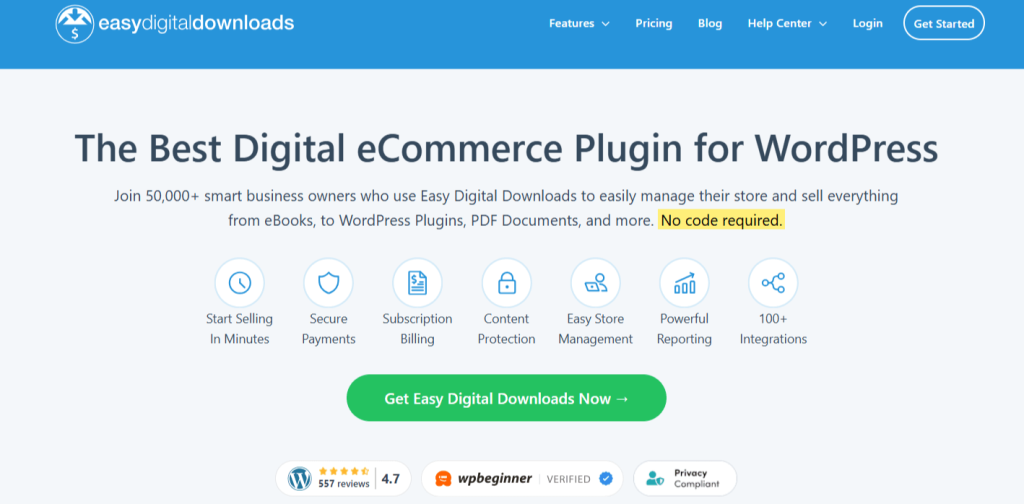
Unlike the previous two examples, Easy Digital Downloads (EDD) is an ecommerce platform designed specifically for selling e-books, licenses, courses, music, and other digital products. It comes with prominent features like customizable product pages, discount codes, file access control, and seamless payment integration.
EDD’s advanced security protects content from fraudulent downloads and unauthorized sharing. Responsive checkout forms and one-click payments make EDD an excellent tool for quickly launching a digital business.
Though it primarily focuses on digital goods, it can also handle physical products with the help of extensions.
What We Liked About EDD
- Reporting and Analytics: Detailed sales reports and customer insights help businesses track performance and make data-driven decisions
- Email Receipts: Automatically generates a purchase receipt and sends it to users via email with a customizable message.
- Refunds and Disputes: Advanced order management thoroughly monitors the entire subscription process, facilitating a smooth refund experience if required.
What We Disliked About EDD
- Payment Gateway: EDD only has Stripe as the default payment gateway, which can be inconvenient for users who prefer other options.
- Limited Free Features: Compared to its competitors, EDD lacks features in the free version.
Pricing
This is a Fremium plugin. There are four subscription plans: Personal ($99.50), Extended ($199.50), Professional ($299.50), and All Access Pass ($499.50) billed annually.
4. MemberPress
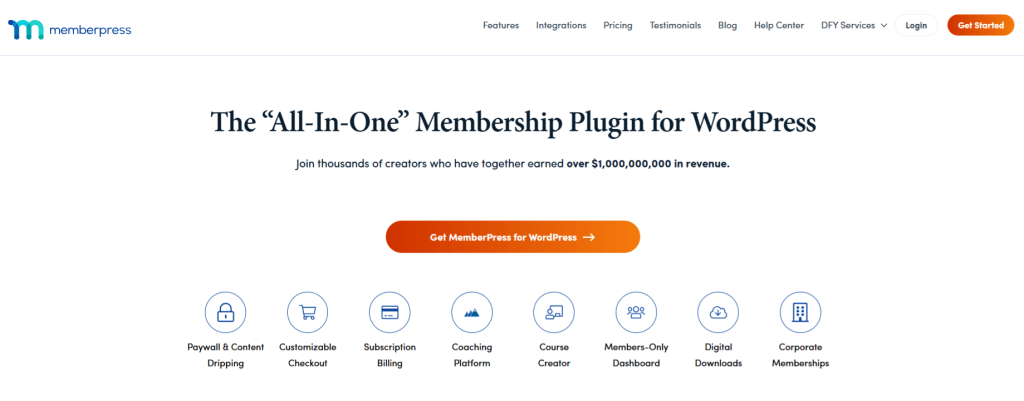
MemberPress is another WordPress alternative to Ecwid for creating and managing membership sites. It allows users to sell digital products, manage subscriptions, and restrict access to content based on membership levels. MemberPress is suitable for businesses looking to monetize their content through memberships, LMS, or digital downloads.
Integrating MemberPress with Easy Digital Downloads (EDD) adds to its benefits even further by enabling the creation of membership tiers, each with unique access permissions. This creates a personalized digital ecommerce experience tailored to users’ membership statuses.
What We Liked About MemberPress
- Clone Roles: It helps the administrator create new roles by simply copying an existing one.
- Deny Access: A pre-configured message appears whenever an unauthorized user attempts to access a restricted product.
- Complete Control: Administrators can monitor the activities of others, change their role anytime, and renewal-expiration.
- Promotional Activities: Option for offering discounts, coupons, or gifts to both existing and new members.
What We Disliked About MemberPress
- Built-in Affiliate Management: We couldn’t find any built-in affiliate marketing feature that could have helped generate more sales.
- Compatibility Issue: Lack of integration with Elementor is among the top complaints by users.
Pricing
Premium subscription is required. Paid plans consist of Basic ($179.50/year), Plus ($299.50/year), and Pro ($399.50/year).
Alternatives Outside WordPress
5. Shopify

Shopify is a well-established leader in the ecommerce space, providing effective solutions for building online stores outside the WordPress ecosystem. Launched in 2006, it provides a user-friendly interface, a wide range of customizable templates, and advanced features to facilitate online selling.
With over 4.47 million active users daily, it has proven to be a trusted choice for entrepreneurs and businesses worldwide. In addition to its extensive range of features, Shopify is a self-hosted platform that uses global CDNs to ensure faster load times.
What We Liked About Shopify
- Scalability: With features to effortlessly scale your website from small to large, users can seamlessly grow alongside their business needs.
- Developer Network: With over 4,000 world-class developers, customization and associated help are always easily accessible.
- Customization Options: A massive library of themes and apps (8000+) helps users customize their storefronts to fit their brand.
What We Disliked About Shopify
- Learning Curve: Shopify can be overwhelming for beginner-level users, especially if they try to customize it on their own.
- Pricey Packages: Small-level enterprises might find their pricing plan quite costly, which can impact their growth negatively.
Pricing
This is a Premium plugin. The Basic plan for solo entrepreneurs starts at $19/month.
Other options include Shopify for Small Teams at $49/month, Advanced at $299, and Plus at $2,300/month. Get the first month for just $1 on the first three plans.
6. BigCommerce
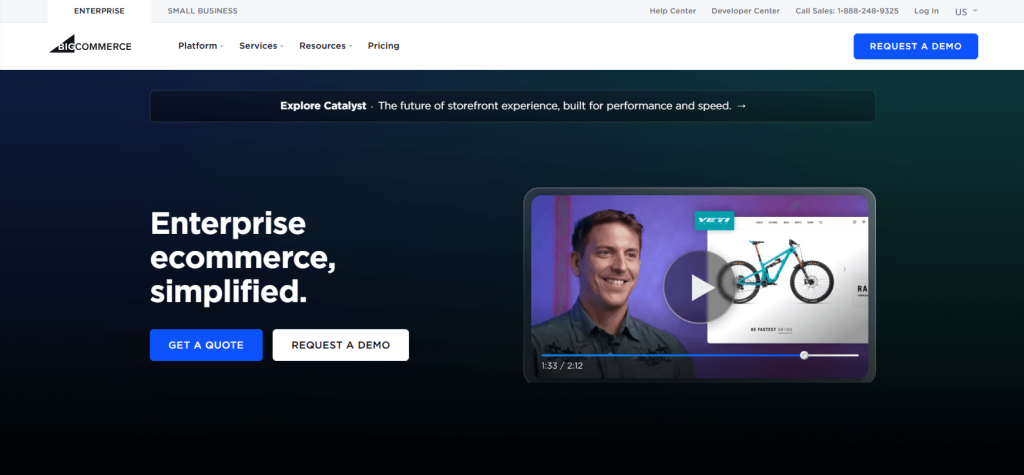
BigCommerce stands out as a leading cloud-based ecommerce platform, tailored for enterprise-level businesses. Its “Essentials” plans are specifically developed for small to medium-sized businesses, providing both flexibility and scalability to support their growth.
Its intuitive drag-and-drop design makes customization effortless, while its mobile-responsive features ensure a smooth experience across all devices. In terms of its theme collection, BigCommerce has a total of 256 themes ranging in various categories of which 12 are completely free to avail.
Another big benefit of BigCommerce is its comparatively low payment fees starting at 2.59%, which is on average 2.9% on other platforms.
What We Liked About BigCommerce
- Universal Use: Physical, digital, or intangible, BigCommerce stores can showcase it all.
- WordPress Compatibility: Beneficial for WordPress users as they can sync BigCommerce data directly onto their WordPress dashboard.
- Rugged Security: Multiple security certifications showcase its defenses against possible security breaches.
What We Disliked About BigCommerce
- Lacks Free Features: BigCommerce lacks in key areas like unlimited sales, email marketing, multilingual support, and free themes.
Pricing
BigCommerce offers three paid plans for the Essential package: $39 per month for Standard, $105 for Pro, and $399 for Plus, with discounts available for annual subscriptions. For the BigCommerce Enterprise plan, users must contact support for a custom quote.
7. PrestaShop

PrestaShop, like WooCommerce, is a flexible open-source ecommerce platform that allows users to easily create and manage online stores. It offers full freedom to download, customize, and upgrade the platform to suit individual needs and skill levels, providing a tailored experience for every user.
From an ecommerce business perspective, PrestaShop offers an easy-to-use platform with an attractive front-end and back-end interface. Its highly efficient product management system, multi-storefront capabilities, and multilingual support make it a strong contender for those looking to make the switch from Ecwid.
What We Liked About BigCommerce
- Default Payment Solutions: It includes pre-installed payment gateways and allows easy integration of additional payment methods.
- Customized Fonts: PrestaShop offers various custom fonts for a stunning front-end appearance.
- SEO Friendly: PrestaShop is built with SEO-friendly features, increasing the chances of higher ranking in SERP results.
What We Disliked About BigCommerce
- Additional Expenses: Modules brought from the official marketplace i.e. PrestaShop Edition can be costly.
- Module Conflict: Since PrestaShop modules are developed independently, they often conflict with each other.
Pricing
The core PrestaShop is free to download and use. However, additional themes, templates, and modules may require payments. You can find the official PrestaShop Marketplace here.
Ecwid Alternative Essentials
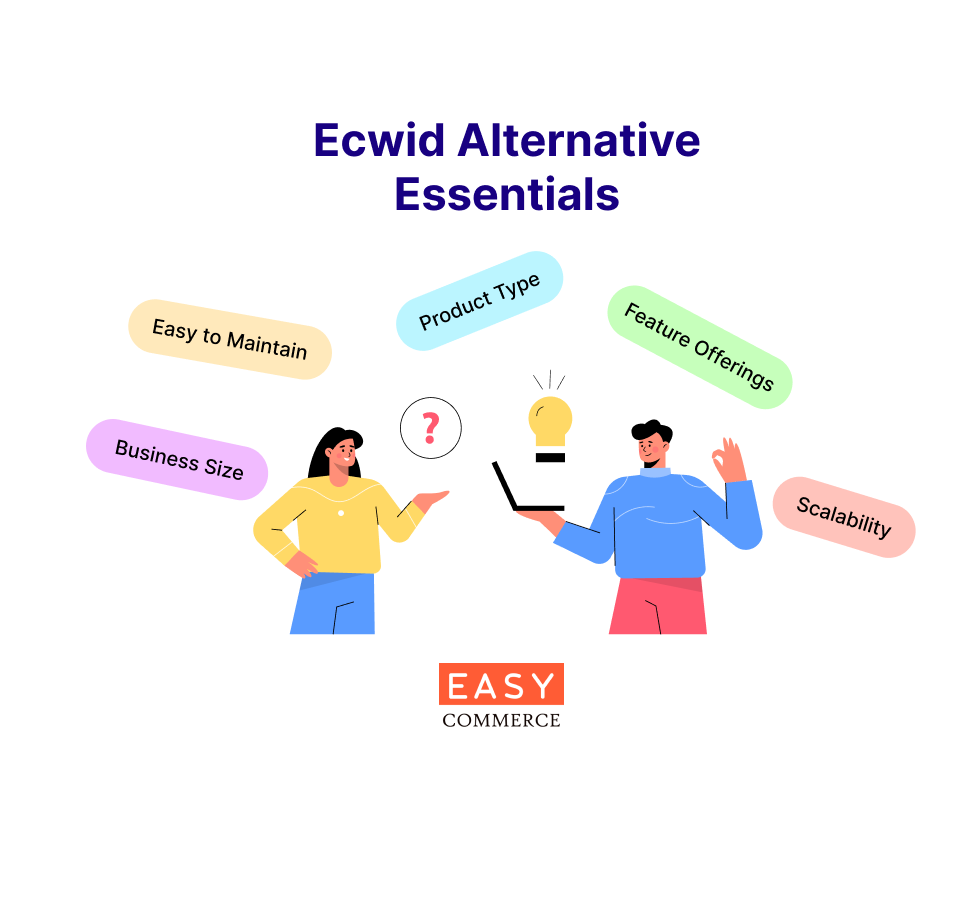
Product Type
When selecting an alternative to Ecwid, consider the type of products you will sell. It could be physical products such as home utensils, digital products like e-books, music, software, or membership subscriptions.
Some platforms are better suited for physical goods, while others excel in digital products or services. Ensure the alternative supports your specific product type and meets your business needs.
Business Size
The size of your business is a critical factor in choosing an Ecwid alternative. Small businesses may benefit from user-friendly platforms with affordable pricing, while larger enterprises may require powerful solutions with advanced features, such as multi-store capabilities and extensive customer support.
Here’s the list of the top ecommerce platforms for small businesses if you want budget-friendly options with intuitive features.
Feature Offerings
Look for alternatives that offer essential functionalities such as customizable storefronts, payment gateways, SEO tools, and marketing integrations.
Analyze which features are most important to your business and ensure the alternative provides and performs them effectively.
Easy to Maintain
An ideal Ecwid alternative should prioritize ease of maintenance, enabling you to concentrate on growing your business instead of dealing with technical challenges.
Choose a platform that offers intuitive interfaces, simple updates, and user-friendly product management features for ecommerce stores.
Scalability
The selected platform should accommodate your ecommerce business, as it scales from small to enterprise level. It should offer seamless upgrade plans to accommodate increasing traffic, product listings, and customer transactions without compromising performance.
You Might Also Like
Conclusion
Ecwid has been invaluable in shaping some of the best ecommerce websites available. But nothing is perfect, at least not for everyone at the same time.
If you’re ready to move on from Ecwid or looking for a fresh start, the alternatives mentioned above can help you build and manage a business website tailored to your preferences.
To find the best option, start by setting criteria such as business size, product type, technical expertise, and budget. Then, compare these factors across various Ecwid alternatives to make an informed decision.
Frequently Asked Questions (FAQs)
What is better than Ecwid?
EasyCommerce, a WordPress-based solution, and Shopify, a non-WordPress platform, are two excellent alternatives to Ecwid. Both offer extensive customization, advanced features, and flexibility to meet diverse business needs.
What is the best free alternative to Ecwid?
The best free alternative to Ecwid is EasyCommerce. As a WordPress plugin, it offers extensive customization options and is equipped with a wide range of essential features.
It can support both physical products and digital downloads, making it ideal for building and managing online stores without upfront costs.
What percent does Ecwid take?
Ecwid does not impose transaction fees when customers use default payment gateways like Stripe or Square.
However, if merchants opt for Lightspeed as their payment processor, they will incur additional charges of 2.6% + $0.30 per transaction for U.S. and Canadian sellers.

